 185 citations,
August 2005 in “Autoimmunity Reviews”
185 citations,
August 2005 in “Autoimmunity Reviews” Alopecia areata is an autoimmune condition causing hair loss due to the immune system attacking hair follicles, often influenced by genetics and stress.
68 citations,
December 2010 in “The journal of investigative dermatology/Journal of investigative dermatology” HOXC13 is essential for hair and nail development by regulating Foxn1.
 57 citations,
March 2013 in “Journal of Dermatological Science”
57 citations,
March 2013 in “Journal of Dermatological Science” Improving the environment and cell interactions is key for creating human hair in the lab.
 40 citations,
November 2017 in “International journal of nanomedicine”
40 citations,
November 2017 in “International journal of nanomedicine” DA liposomes with chloramphenicol effectively target hair follicles and combat MRSA with minimal skin toxicity.
February 2025 in “Biomolecules” RORA boosts autophagy in hair follicle stem cells, potentially aiding hair growth.
 71 citations,
October 2008 in “The journal of investigative dermatology/Journal of investigative dermatology”
71 citations,
October 2008 in “The journal of investigative dermatology/Journal of investigative dermatology” HFMs can help study hair growth and test potential hair growth drugs.
February 2025 in “International Journal of Molecular Sciences” Maternal melatonin improves offspring hair growth by affecting specific proteins and pathways.
42 citations,
February 1996 in “Journal of Investigative Dermatology” Polyamines, especially spermidine, are essential for hair growth.
 41 citations,
March 1998 in “Archives of Dermatological Research”
41 citations,
March 1998 in “Archives of Dermatological Research” The enzyme that changes testosterone to a stronger form is mostly found in the part of the hair follicle called the dermal papilla.
 134 citations,
January 2010 in “Biomedical research”
134 citations,
January 2010 in “Biomedical research” Low oxygen conditions increase the hair-growing effects of substances from fat-derived stem cells by boosting growth factor release.
 August 2016 in “Journal of Investigative Dermatology”
August 2016 in “Journal of Investigative Dermatology” DHT reduces a cell's ability to promote hair growth, while 3D culture without DHT improves it.
 26 citations,
January 1994 in “McGraw-Hill eBooks”
26 citations,
January 1994 in “McGraw-Hill eBooks” Many hair loss conditions can be treated.
 January 2021 in “Journal of Allergy and Therapy”
January 2021 in “Journal of Allergy and Therapy” Electric Follicle Stimulation may promote hair growth and density with no known side effects.
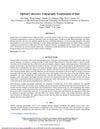 September 2014 in “Proceedings of SPIE, the International Society for Optical Engineering/Proceedings of SPIE”
September 2014 in “Proceedings of SPIE, the International Society for Optical Engineering/Proceedings of SPIE” OCT can effectively examine and reveal details about human hair and scalp conditions.
 May 2009 in “Medical and surgical dermatology/Medical & surgical dermatology”
May 2009 in “Medical and surgical dermatology/Medical & surgical dermatology” Hair and nail conditions can stabilize or improve over time, and new treatments show promise.
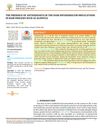 June 2022 in “International Journal of Research -GRANTHAALAYAH”
June 2022 in “International Journal of Research -GRANTHAALAYAH” Antioxidants like catalase are important for preventing hair loss conditions like alopecia.
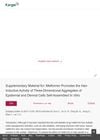 January 2021 in “Figshare”
January 2021 in “Figshare” Metformin helps regenerate hair follicles in lab conditions.
 28 citations,
November 2013 in “The journal of investigative dermatology/Journal of investigative dermatology”
28 citations,
November 2013 in “The journal of investigative dermatology/Journal of investigative dermatology” GMG-43AC may help reduce unwanted hair growth and treat certain hair loss conditions.
 10 citations,
September 2020 in “Computational and Mathematical Methods in Medicine”
10 citations,
September 2020 in “Computational and Mathematical Methods in Medicine” Researchers developed an algorithm for self-diagnosing scalp conditions with high accuracy using smart device-attached microscopes.
January 2024 in “Brazilian Journal of Hair Health” Hair science has grown significantly, focusing on conditions like alopecia and improving treatments and techniques.
 September 2022 in “bioRxiv (Cold Spring Harbor Laboratory)”
September 2022 in “bioRxiv (Cold Spring Harbor Laboratory)” The research provided new insights into the genetic factors contributing to hair loss and skin conditions by analyzing individual cells from the human scalp.

Collagen peptides may help maintain hair growth and could be beneficial for hair loss conditions.
 20 citations,
April 2006 in “Dermatologic Clinics”
20 citations,
April 2006 in “Dermatologic Clinics” Antiandrogen therapies are beneficial for treating skin and hair conditions related to androgen levels.
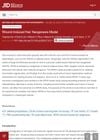 5 citations,
September 2022 in “Journal of Investigative Dermatology”
5 citations,
September 2022 in “Journal of Investigative Dermatology” Careful selection of mice by genetics and age, and controlled housing conditions improve the reliability of hair regrowth in wound healing tests.
 5 citations,
November 2008 in “Advances in Dermatology”
5 citations,
November 2008 in “Advances in Dermatology” The review highlights the importance of stem cells in hair health and suggests new treatment strategies for hair loss conditions.
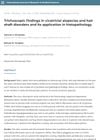 1 citations,
November 2017 in “International Journal of Research in Medical Sciences”
1 citations,
November 2017 in “International Journal of Research in Medical Sciences” Dermoscopy helps distinguish between scarring and non-scarring hair loss and accurately diagnoses hair and scalp conditions without needing hair plucking.
 1 citations,
February 2013 in “InTech eBooks”
1 citations,
February 2013 in “InTech eBooks” Genetic mutations cause various hair diseases, and whole genome sequencing may reveal more about these conditions.
 January 2023 in “Vìsnik problem bìologìï ì medicini”
January 2023 in “Vìsnik problem bìologìï ì medicini” Androgenic alopecia causes hair follicle degradation and skin restructuring, but some hair elements remain.
 August 2007 in “Journal of Investigative Dermatology”
August 2007 in “Journal of Investigative Dermatology” The meeting discussed vitamin D3's role in fighting tuberculosis, potential treatments for skin conditions like psoriasis, and hair follicle regeneration as a possible solution for hair loss.
 February 2004 in “The New England Journal of Medicine”
February 2004 in “The New England Journal of Medicine” The book is a comprehensive resource on hair disorders, but lacks information on some conditions.

























